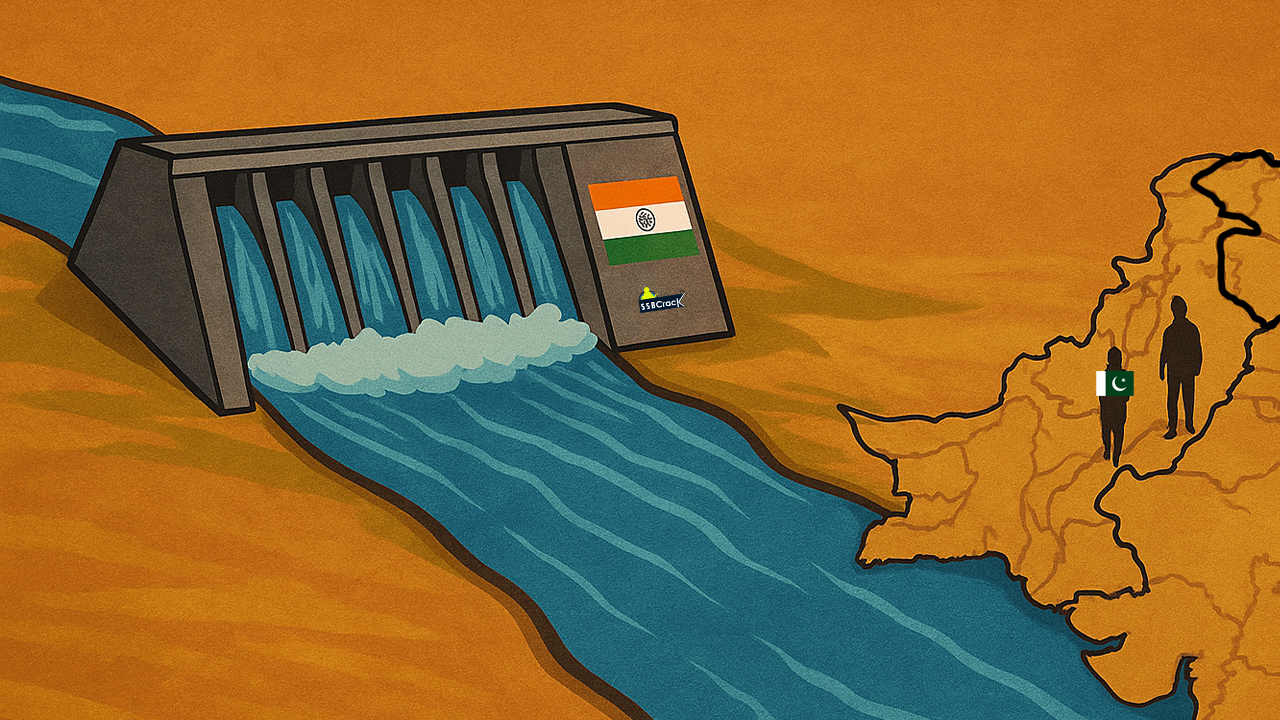In a bold diplomatic and strategic move following the Pahalgam terror attack that killed 26 civilians, India has placed the Indus Waters Treaty (IWT) of 1960 in abeyance for the first time in history. The message is clear: blood and water can no longer flow together.
This pause in the treaty—signed between India and Pakistan under the World Bank’s mediation—has given India leverage to exercise greater control over the Indus River system, especially the western rivers (Indus, Jhelum, Chenab), which were earlier earmarked for Pakistan’s unrestricted use.
What is Indus Water Treaty (IWT)
The Indus Waters Treaty (IWT) is a landmark water-sharing agreement signed between India and Pakistan on September 19, 1960, after nine years of negotiations facilitated by the World Bank. The treaty was designed to resolve disputes over the use of the Indus River system, which is vital for both countries’ agriculture and livelihoods. Under the IWT, the six rivers of the Indus system were divided: India received exclusive rights over the three eastern rivers—Ravi, Beas, and Sutlej—while Pakistan was given control over the three western rivers—Indus, Jhelum, and Chenab.
India is obligated to let the waters of the western rivers flow into Pakistan, with limited exceptions for domestic use, non-consumptive needs, irrigation, and run-of-the-river hydroelectric projects that do not significantly alter the water flow or storage. The treaty also established a Permanent Indus Commission, with representatives from both countries, to oversee its implementation, exchange data, and resolve disputes through a set procedure. The IWT is widely regarded as one of the most successful international water-sharing arrangements, having survived multiple wars and periods of tension between India and Pakistan.
However, it remains a point of contention, especially regarding the design and operation of Indian hydroelectric projects on the western rivers, as Pakistan is heavily dependent on these waters for agriculture and rural livelihoods. The treaty has recently come under strain, with India announcing its suspension in April 2025 following a terrorist attack, raising concerns about the future of water security and cooperation in the region
How India Will Stop Indus Water Flow to Pakistan?
1. Major Infrastructure Projects That Limit Water Flow to Pakistan
India has already built or revived several dam and hydropower projects designed to either store or divert water from flowing into Pakistan:
| Project | River | Purpose | Status |
|---|---|---|---|
| Kishanganga HEP | Jhelum tributary | Hydropower + diversion via tunnel | Completed (2018) |
| Ratle HEP | Chenab | 850 MW hydroelectric project | Revived (2021) |
| Tulbul Navigation Project | Jhelum | Flow regulation + navigation | Revived post-Uri (2016) |
| Shahpurkandi Dam | Ravi | Stops surplus water to Pakistan | Completed Feb 2024 |
| Ujh Multipurpose Project | Ravi tributary | Storage, irrigation, hydroelectric power | In planning stage |
| Sutlej-Beas Link | Sutlej/Beas | Diverts water within India | Stalled – land issues |
2. Operational Measures: Leveraging Treaty Suspension
With the IWT on hold, India can now implement tactical and strategic operational measures:
- Reservoir Flushing: India can now flush silt from reservoirs like Kishanganga at strategic times—disrupting Pakistan’s irrigation cycles.
- Data Withholding: India is no longer obligated to share real-time hydrological data with Pakistan, impacting flood forecasts and crop planning.
- Inspection Ban: Pakistani teams can no longer inspect hydro projects in Jammu & Kashmir.
- Autonomous Operations: India can ignore objections from Pakistan regarding dam construction, flow regulation, or tunnel usage.
3. Flow Diversion Strategy: From West to East
India is also working on inter-basin transfers, using tunnels or links to divert water from western rivers (meant for Pakistan) into eastern rivers (India’s full right):
- Shahpurkandi and Ujh Dams can reduce water outflow to Pakistan.
- Tunnel-based Chenab-to-Ravi diversions are being studied to bypass Pakistani territory.
4. Legal Position and Treaty Interpretation
Can India Abrogate the IWT?
Under Article XII of the Treaty, India cannot unilaterally terminate the IWT. Any cancellation must be through mutual consent. However, India’s suspension signals a functional withdrawal, not legal termination.
India’s Legal Shield:
- India is not a signatory to the Vienna Convention on the Law of Treaties (1969), which governs treaty withdrawal.
- However, India references its clauses selectively as customary international law, maintaining legal defensibility while asserting national interest.
Impact on Pakistan
Severe Agricultural Shock
- Over 80% of Pakistan’s irrigated agriculture depends on Indus basin waters.
- Any disruption during sowing season (summer) could devastate wheat, rice, and sugarcane crops.
Urban Water Crisis
- Cities like Lahore, Multan, and Karachi draw drinking water from the Indus.
- Water scarcity could trigger a public health and humanitarian crisis.
Flood Management Collapse
- Without upstream real-time flood data, Pakistan may be caught unprepared during heavy monsoons.
Pakistan’s Limited Options
Dispute Resolution via World Bank
- Through the Permanent Indus Commission (PIC) → Neutral Expert → Permanent Court of Arbitration.
- But India’s current stand may disregard the arbitration process, as done with the Kishanganga and Ratle disputes.
International Pressure
- Pakistan may appeal to global institutions like the UN, World Bank, or ICJ.
- However, international legal bodies have no jurisdiction over the treaty unless both nations agree.
Conclusion: India’s Water-as-Weapon Doctrine
India’s pause on the Indus Waters Treaty isn’t merely symbolic—it’s backed by years of engineering groundwork, diplomatic resolve, and geopolitical timing. By creating strategic infrastructure, India is now positioned to weaponize water without crossing into overt conflict—an assertive policy meant to recalibrate Pakistan’s support for cross-border terrorism.
As the dams rise and the rivers redirect, Pakistan will feel the heat—not just diplomatically, but in its fields, taps, and economy.













